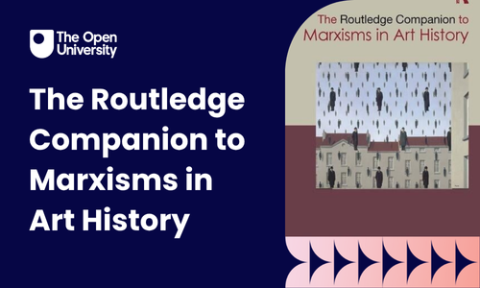The Routledge Companion to Marxisms in Art History

Three members of the OU’s Department of Art History have authored chapters in a landmark new book, The Routledge Companion to Marxisms in Art History. Edited by T. Tunalı and B. Winkenweder, their contributions reflect the Art History Department at the OU’s long term role in developing the field.
Warren Carter’s essay looks at the impact that the tumultuous social upheavals of 1968 had on the development of marxist art history by focusing on the work of T.J. Clark and O.K. Werckmeister. He argues that whereas the former has gradually abandoned the conceptual framework that he laid out in his two two ground-breaking books of 1973 on art and politics in mid-nineteenth-century France, the work of the latter has instead demonstrated a methodological continuity from the early 1970s onwards. If Clark’s later writing skirts perilously close to upholding the modernist canon – finding a type of Adornian negativity as value where Clement Greenberg reads formal purity – then Werckmeister has consistently sought to knock down such edifices in a form of ideology critique that engages with a far more diffuse range of cultural artefacts from the music of Kraftwerk to Japanese anime.
Kim Charnley’s essay explores the concept ‘deskilling’ which is used in materialist accounts of modern and contemporary art. Developments such as Duchamp’s ‘readymade’, Pollock’s ‘drip painting’ and conceptual art, have all subverted or transformed assumptions about artistic skill. Materialist studies explore these developments, and others like them, in relation to wider social process such as industrialisation and automation. What does ‘deskilling’ in art reveal about the unstable social meaning of skill, caused by technological transformation and economic crises? Charnley explores some of the answers to this question provided by Marxist art historians, theorists and artists in debates that span from the middle of the twentieth century to the present day. He also provides a historiography of the use of the term ‘deskilling’ in artistic debates, in a contribution that is intended to clarify the stakes involved in this important and widely used critical term.
Andrew Murray’s essay ‘Speculation’ analyses two recent images technologies, NFTs and AI. He compares artworks by Mike Winkelmann (aka Beeple) and Simon Stålenhag, artists who are, respectively, for and against these technologies. Each artist articulates their respective considerations of contemporary capitalism and technology in their painting through depictions of idols, man-made objects that are worshipped. Andy argues that these theological discourses are responses to the networks of capital in which these artists operate, one whereby both value and images seem to emerge free of human labour. Winkelmann, Andy argues, cynically participates in the image worship they portray, as they enact the form of financial speculation they claim to satirise through being financialised as NFTs. While Stålenhag’s work is just as embedded as Beeple’s within the popular entertainment industry, they nevertheless demonstrate critique in that they narrate historical, economic, social and geographic conditions that generate new forms of idolatrous behaviour.
Request your prospectus
![]()
Explore our qualifications and courses by requesting one of our prospectuses today.